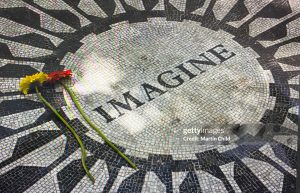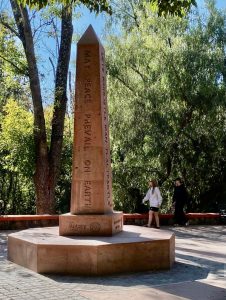What if all children everywhere were taught by their parents, their school teachers, and their religious leaders that all human beings everywhere – regardless of their seeming differences – deserve recognition and respect?
What if those children learned in a class called World History about the many accomplishments of and gifts from all peoples everywhere — on every continent – over the centuries. How, to give just a few small examples, the Arab world gave us mathematics and astronomy, Africans gave us architecture and metallurgy, and Mesoamericans gave us science, technology, and the calendar. We are the beneficiaries of those gifts. We’re wise to acknowledge those accomplishments and appreciate them.
If we don’t learn these things in grade school – as I never did – it may take decades, a lot of serious reading, much higher education, as well as wide-world travels and cross-cultural connections to become enlightened to such truths.
Yes, I’m hearing John Lennon in my head singing “Imagine.”

I’m reading a terrific book right now, which I highly recommend, titled The Vulnerables, a new novel by Sigrid Nunez about one writer’s life in New York during the pandemic. I highlighted this passage from it last night because it spoke to me:
“For the writer, obsessive rumination is a must. Imagination must follow dark thoughts to dark places; you can’t ever just say, Stop, don’t go there. And isn’t that the job, to imagine the lives of others and what they are going through?”
I ruminate a lot. And I ask a lot of “Why?” and “What if?” questions. I can’t seem to help myself. I have baskets full of questions for which I have no answers. Yet I continue to dig for those answers, like a dog for buried beef bones. I’ve got to go there.
(When I was a kid my mom always used to tell me that I asked too many questions. “I don’t have the answers, honey,” she’d say, exhausted and exasperated, “go ask your teachers.” [My teachers didn’t seem to know either.] Then once, when I was twenty-seven, she said to me, “If you keep beating men at tennis, you’re going to wind up alone.” Sometimes my mom was right.)
But getting back to cross-cultural enlightenment, I’ll continue to ruminate:
One of the ultimate dangers of such un-enlightenment, in my view, is war. When young military recruits are indoctrinated into believing that the enemy they’re assigned to slaughter is subhuman – “vermin” or “animals” out to do us all in – war becomes possible, perhaps inevitable. In the twistedness of this mentality, killing becomes honorable, even praiseworthy. Would a soldier who’d been raised to respect all others think this way and willingly participate?
Perhaps that’s why such respect is not generally taught in public schools in the U.S.: because the U.S. has proven itself to be a bellicose country (war is big business, and, as they say, “The business of America is business”), a country that prides itself on its military might?
I dated a fellow once who wiggled out of the draft during the Viet Nam war, claiming he was a Quaker (which he wasn’t). What he was, was a privileged, white, straight, well-educated young man with powerful family connections. But what if we all could become Quakers when it came to war?
And what if we all had the same shade of colorful skin? I’ve never understood why so many of my fellow white people consider themselves superior to other groups simply because of this thin, pale tissue paper that I too am wrapped in. Ridiculous, in my view.
I could go on, but I’ll stop here, at least for now. Essays are meant to provoke thought, not necessarily provide answers. And the beginning of the year is a good time, I think, to think about the What ifs and to imagine a better world. There was a time, during my lifetime, when the thought of so many cigarette-addicted smokers quitting altogether was unthinkable. But that happened. Miracles do happen.
~ ~ ~ ~ ~ ~ ~ ~ ~
- You might like to read a previous WOW post in which I wrote a bit about Quakers and comparative religions: www.blog.bonnieleeblack.com/friends/ .
- Yesterday, on a walk in San Miguel de Allende’s beautiful Parque Juarez, I took this photo of the Peace Pole that was unveiled here six years ago. Each side of it is inscribed in a different language, “May Peace Prevail on Earth.” (For more background on this Peace Pole, go to: www.blog.bonnieleeblack.com/the-unveiling/ .


I once thought of writing a book with the title Unanswered Questions, or Pecados Que Cuento. I never did – it took me to the dark places I prefer not to go.
I also believe in the benefits of travel, especially where we ( the white people) are the minority. It allows us to see other people- their culture, their scenery, their way of life – without the bias of our upbringing or education (or lack thereof). And hopefully without judgment due to those biases.
Miracles do happen – we have to be open to them. Be the peace.
Thank you, Barb. You certainly live your beliefs and are an inspiration in doing so! Enjoy your stay in Thailand.
Lovely post, dear Bonnie. I’m reminded of a poster from the 60s, with the slogan “What if they gave a war and nobody came?
Gracias, dear Rhoda. That “what if” hasn’t materialized yet. Maybe one day? We can only hope.
So true, BonnieDear. Nothing like reading other people’s stories to give one compassion. And nothing like writing to give you the ability to think clearly about all sides of an issue. I fear that these will be bygone arts within another generation. Already, they are severely diminished by technology. Thank you for your thoughts. xoxo ~ Be
Thank you, BeDear, for YOUR thoughts. I always appreciate knowing your point of view. — BB xx
Love your columns. You make us think about our surroundings in expanded ways!
Thank you, Judy. I’m so glad you do. 🙂
Bonnie querida, what a beautiful reflection. Let’s imagine good things and a peaceful feature, yes!
Yes, querida, in John Lennon’s words, “Imagine all the people living life in peace…” Hard to imagine, but… Love to you and Gary, BB xx
Brava, dear wise one! Eye opening and truly enlightening thoughts to contemplate as we journey forth in a topsy turvy world. Thank you, Bonnie. ❤️
Thank YOU, dearest Michael. But I’m far from wise; it’s an ongoing quest! Mucho love to you and Tony. — xoxoxoxox
Pleasant aspirations but I fear hopeless. Since the beginning of time, we humans have divided by clan, tribe, color, religion, politics or whatever the hell we can dream up! We can’t get along with our families much less our neighbors, friends and “those people” on the other side of the tracks or the country or the world.
War and strife is in our dna. Its only in our twilight years we begin to see the pointlessness of the whole “business”.
Thank you for adding to the conversation. You certainly have a valid point of view, which is no doubt shared by many people, especially those who are not living in war zones.
Thank you for another great read!
De nada, mi amiga!
Good one
Beautiful Bonnie!
Thank you, querida! Glad you liked it.
Hi Bonnie, I am grateful you shared the link to your blog with me. Now I am subscribed! Thank you for your post. I ponder about these things often, too. When we had our first child, we decided we would homeschool for many of the points you wrote about above. And more of course. We chose to both teach our children through the natural world (and our farm), our community, books written by authors from different cultures and backgrounds (and what an AMAZING selection there is for young people today!), and in part with a pretty great curriculum we found that teaches through stories from different cultures. The stories follow people throughout the world, beginning with a person’s birth, following them as they grow up and into adulthood. Through these stories, and sinking into the cultural traditions, the students develop a connection to the culture and compassion for the people as fellow humans. As my daughter later learned stories of wars, she didn’t see either side as the bad guys, or at least not the People of these lands. I know it is a life’s work, and I’m constantly trying to grow as one of their teachers, but I feel so grateful for the path we have chosen for our children’s education. Ok, this is all just to share, and say yes, yes. And thank you. xojenny
Dear Jenny — Thank you so, SO much for sharing your homeschooling experience here with WOW readers. You are a shining example of how kids can learn about cross-cultural connection. Perhaps I should title my next blogpost “If only…” — Love and best wishes for 2024 to you and your lovely family.
Dear Bon,
Your idea is wonderful, and I think a majority of Americans would agree. You are also correct in thinking it probably won’t happen. It’s funny, isn’t it, that in the greatest democracy, the majority doesn’t necessarily win. Before I read this, I reading about our new budget with its widening spending gap between military and human spending. One of the dark thoughts I ruminate over is how much longer will public education survive.
If we Americans were taught that all humans deserve respect and recognition, it would benefit all. Instead, certain groups are marginalized, while one group is taught to hate everyone not on their side. Who benefits most from this?
If I was going to join an organized religion, I would be a Quaker. How I admire their tenets of peace and non-violence, teaching tolerance and service, integrity, conflict resolution, and emphasizing dialogue and inquiry. If these concepts guided those in our hallowed halls, who would benefit?
Love,
Paul
Ah, yes, dear Paul, that’s the bottom-line question, isn’t it? WHO BENEFITS? Thank you for your thoughtful and sensitive response. As a retired high school teacher in the public school system, you know whereof you speak! — BB xx